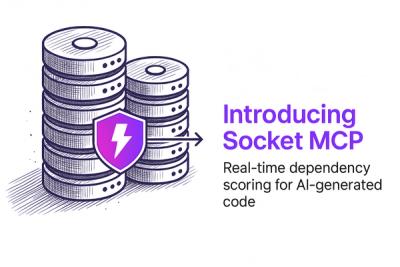
Product
Secure Your AI-Generated Code with Socket MCP
Socket MCP brings real-time security checks to AI-generated code, helping developers catch risky dependencies before they enter the codebase.
Gib is a build tool for static assets inspired by NGBP, Brunch and Grunt. Built on top of gulp, Gib is declaratively configured, favors convention and is extensible. It may be used in an existing gulp file and gulp tasks may be created directly in a gibberish file.
Gib is usable with gulp and has it's own CLI. It is configured declaratively
using a plain old js object or JSON format called gibberish. Gib will
define several default tasks including: build, compile, watch, server.
You may use gib to declaratively configure tasks in your gulp file. You may continue using your own gulp tasks, extending your build as necessary.
After installing gulp and gib, you may do gulp to start a development watcher.
gulp compile will produce production assets.
var gib = require('gib');
var gulp = require('gulp');
// Gib configuration:
var config = {
// Destination for built assets:
build: 'build',
js: {
// JS target using browserify:
'scripts/site.js': {
browserify: true,
src: './src/index.js'
}
},
less: {
// Less target for vendor assets:
'styles/site-vendor.css': [
'../vendor/styles/bootstrap/bootstrap.less',
'../vendor/styles/font-awesome/font-awesome.less',
],
// Less target using custom watch pattern and single entry:
'styles/site.css': {
watch: './**/*.less',
src: './styles/index.less'
}
},
// Misc. static assets:
assets: {
'': 'assets/**/*'
},
// Development index populated with js and css targets:
index: {
'index.html': './markup/index.html'
}
};
// Populate gulp file:
gib.gulpfile(config, gulp);
// Extend build with custom gulp tasks here:
The Gib CLI reads a declarative config from a file gibberish.js by default.
All it does right now is run the default task: development build and watch.
We'll build out a clean interface soon; for now it is recommended to use Gib
with gulp.
module.exports = {
// Destination for built assets:
build: 'build',
js: {
// JS target using browserify:
'scripts/site.js': {
browserify: true,
src: './src/index.js'
}
},
less: {
// Less target for vendor assets:
'styles/site-vendor.css': [
'../vendor/styles/bootstrap/bootstrap.less',
'../vendor/styles/font-awesome/font-awesome.less',
],
// Less target using custom watch pattern and single entry:
'styles/site.css': {
watch: './**/*.less',
src: './styles/index.less'
}
},
// Misc. static assets:
assets: {
'': 'assets/**/*'
},
// Development index populated with js and css targets:
index: {
'index.html': './markup/index.html'
}
};
Gib may be used to build a number of other projects, notably NGBP. To try this:
git clone https://github.com/ngbp/ngbp.git clone ngbpnpm install --save-dev gib gulp install gulp and gibgulpfile.jsgulp start the development watcherFAQs
Declarative build tool powered by gulp.
The npm package gib receives a total of 3 weekly downloads. As such, gib popularity was classified as not popular.
We found that gib demonstrated a not healthy version release cadence and project activity because the last version was released a year ago. It has 1 open source maintainer collaborating on the project.
Did you know?

Socket for GitHub automatically highlights issues in each pull request and monitors the health of all your open source dependencies. Discover the contents of your packages and block harmful activity before you install or update your dependencies.

Product
Socket MCP brings real-time security checks to AI-generated code, helping developers catch risky dependencies before they enter the codebase.

Security News
As vulnerability data bottlenecks grow, the federal government is formally investigating NIST’s handling of the National Vulnerability Database.

Research
Security News
Socket’s Threat Research Team has uncovered 60 npm packages using post-install scripts to silently exfiltrate hostnames, IP addresses, DNS servers, and user directories to a Discord-controlled endpoint.